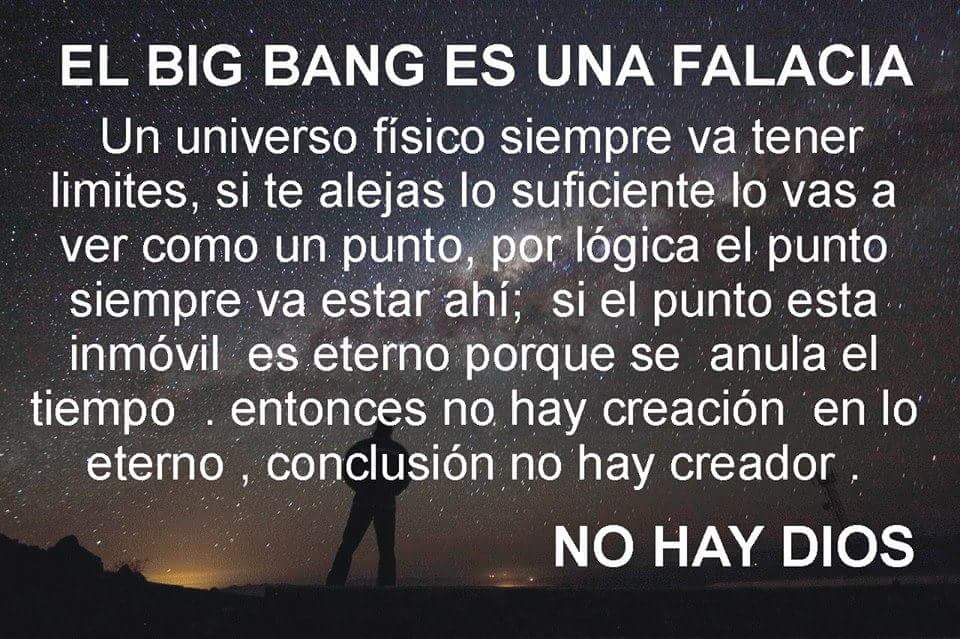You could say the same thing for “Internet theism” in general, IMO. Comment-type formats don’t always seem to elicit the best of human thought, with Youtube seemingly being the apex of iniquity.
To be honest, you’re right.
YouTube and Facebook are places where people like to be seen as Stephen Hawking 2.0
I even saw a guy who said this:
“The Big Bang is a fallacy. If you get away from our Universe, you will see a small dot. That dot will always be there, so time is nullified. There is no creation, there is no Creator, THERE IS NO GOD”
I told him:
“Bravo, now you can go and replace Stephen Hawking, because not even he could prove that God does not exist”
How do you find time to study ![]()
Since the simplest explanation is “God gives me time”, I appeal to Occam’s razor and there we go.
That’s debatable ![]()
I know, but since I can’t find something simpler… Occam.
Here you go. Sign up right away since it starts Dec 4.
Thanks! It looks great.
I hope you’ll sign up. If you don’t have the funds you can apply for a scholarship. If you can’t keep up with the work you can transfer your work to the next class. You can even earn college credit.
It has been mentioned in other threads that publishers decide the wording of the title… whether or not the actual content accomplishes what the title says.
Example:
Dr. Giberson’s book “Saving Darwin : How to Be a Christian and Believe in Evolution” was given that title by the publisher, even thought it doesn’t actually have a chapter on the sub-title. In fact, it is my opinion that there might be just one sentence which could be construed as an answer to the sub-title.
Ironically, and to Giberson’s credit, we have posts on the forum that specifically attribute the book with giving them a new found awareness of the issues!
I’m surprised at the amount of “heat vs. light” there is on the general issue of what Science’s realm is and what Religion’s realm is. I thought all of this was pretty well sorted out once we discovered the DNA molecule. Just how does one prove (or disprove) the existence of a miraculous divine being when there is no science for assessing miracles?
Wow… if you “get away from our Universe”… I hope there’s some gas stations along the way. The only way I know to get “away from our Universe” is to travel to “the Undiscovered Country - - from whose bourn no traveler returns!”
From Hamlet, Cosmologist and Political Analyst (circa 1599 to 1602)
From the play of the same name:Hamlet, Act 3, Scene 1.
Hamlet, Act 3, Scene 1 - on the topic of the Undiscovered Country
For those of you who crave to better themselves, below is a translation of this famous section of Shakespeare.
Hamlet, who had a childhood of dubious happiness, is discussing the pros and cons of death, when his words are ended by the arrival of Ophelia (in a foreshadowing of death coming for all the leading actors in the play!):
The first section is a “translation for the modern ear”, followed by the original.
^^^^^^^^^^^^^^^^^^^^^^^^^^^^^^^^^^^^^^^^^^^^^^^^^^^^^^^^^^^^^^^^
[Translated Text]
After all, who would put up with all life’s humiliations—
the abuse from superiors, the insults of arrogant men,
the pangs of unrequited love, the inefficiency of the legal system,
the rudeness of people in office, and the mistreatment good people
have to take from bad—
When you could simply take out your knife and call it quits?
Who would choose to grunt and sweat through an exhausting life,
unless they were afraid of something dreadful after death,
the undiscovered country from which no visitor returns,
which we wonder about without getting any answers from and
which makes us stick to the evils we know rather than rush off
to seek the ones we don’t?
Fear of death makes us all cowards, and our natural boldness
becomes weak with too much thinking. Actions that should be
carried out at once get misdirected, and stop being actions at
all. But shh, here comes the beautiful Ophelia…
http://nfs.sparknotes.com/hamlet/page_140.html
^^^^^^^^^^^^^^^^^^^^^^^^^^^^^^^^^^^^^^^^^^^^^^^^^^^^^^^^^^^^^^^
[Original Text]
"For who would bear the whips and scorns of time,
Th’ oppressor’s wrong, the proud man’s contumely,
The pangs of despised love, the law’s delay,
The insolence of office, and the spurns
That patient merit of th’ unworthy takes,
When he himself might his quietus make
With a bare bodkin? Who would fardels bear,
To grunt and sweat under a weary life,
But that the dread of something after death,
The undiscovered country from whose bourn
No traveler returns, puzzles the will [< “puzzles”, meaning a kind of paralysis of analysis]
…And makes us rather bear those ills we have
Than fly to others that we know not of?
Thus conscience does make cowards of us all,
And thus the native hue of resolution
Is sicklied o’er with the pale cast of thought,
And enterprises of great pith and moment
With this regard their currents turn awry,
And lose the name of action - -
Soft you now, the fair Ophelia!. . .
^^^^^^^^^^^^^^^^^^^^^^^^^^^^^^^^^^^^^^^^^^^^^^^^^^^^^^^^^^^^^^^
Well, I found the picture, so I can translate it correctly now.
THE BIG BANG IS A FALLACY
A physical Universe will always have limits, if you get far enough you will see it as a dot, and because of logic* it will always be there; if the dot doesn’t move it is eternal because time is nullified. So there is no creation in the eternal, conclusion: there is no Creator.
THERE IS NO GOD
*What a bad logic.
That’s SO dumb.
I know, right?
Juan,
I am sur4e you san see right through the holes in Prof. Carroll’s argument. The most obvious one is that he claims that the Big Bang was not the beginning, but the start of General Relativity. Thus he says that while there was no time, space, matter, ant time, before the Big Bang, this is NOT the beginning. Then, what was it?
Carroll has a basic problem here that goes back to one of the basic ideas that theology and science agree on, which is that the universe is finite or limited. If the universe is composed of matter/energy means that it is finite. If it is finite, then it has a beginning. If it is finite and has a beginning, it has an ending.
If the universe is limited, it has a beginning and an ending. It also has a direction or purpose and meaning. If it is not finite, then it is infinite and the universe is STATIC.
Ironically traditionally science and philosophy have agreed that the universe has no beginning and is basically static. It was the Bible that insisted that the universe has a Beginning. Then Creationism says that the universe has been static since the first 6 days of the Creation.
Only was only less than 100 years ago that science has agreed with the Bible and said that indeed the universe has a Beginning. This is clearly true because it has both natural and human history. Evolution is part of that history so it is part of the evidence that God exists.
You just hit the jackpot.
Proof I have the books. The only thing that worries me is that a user on Reddit said that he lost his faith after reading them because Stenger “destroyed the cosmology and Fine-Tuning arguments”. Luckily, I have responses to Vic’s arguments.
Good point. There might be something to it though; here’s a summary in one review
2b: If a suitably defined supernatural being (God) existed, there would be evidence detectable by scientific means. But in fact, the universe presents evidence precisely to the contrary, firmly establishing that such a God does not exist. (Stenger, the work reviewed here.)
If that’s accurate, the title could be fair (and maybe even self chosen). Hmm. Even Dawkins has a section in “The God Delusion” titled “Why There Is Almost Certainly No God”. More from the review:
Stenger then sets forth his program:
Hypothesize a God who plays an important role in the universe.
Assume that God has specific attributes that should provide objective evidence for his existence.
Look for such evidence with an open mind.
If such evidence is found, conclude that God may exist.
If such objective evidence is not found, conclude beyond a reasonable doubt that a God with these properties does not exist. (p. 43)
I’m seeing the logic of the title better. I’m not sure if I’m interested enough to look up the book though and evaluate his arguments.
The whole thing reminds me of the recent discussion on miracles late in this thread. Might we logically be able to see traces of the miracle’s performance, or does its supernatural source forever blind us to anyscientific knowledge of it?
The sentence “there would be evidence detectable by scientific means … if a supernatural being existed” - - is complete fiddle faddle. It’s a lie. It’s wrong and wrong-headed.
And on such an easy conclusion, I would toss the book right into the trash heap of history.

